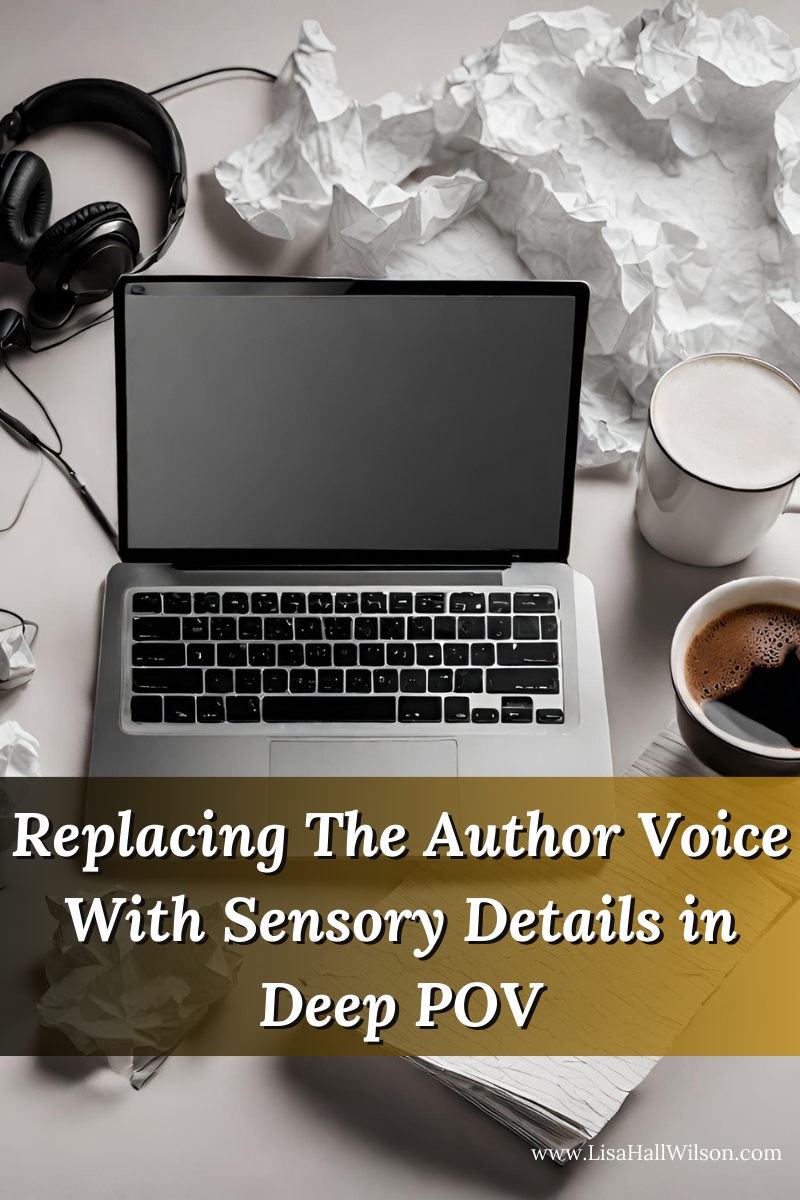Using sensory details is something even new authors know they need to make the most of! With Deep point of view, your use of sensory details needs to level up. Using sensory details is one way to avoid cliché and pull your reader deeper into the story while being super efficient with your words.
Sensory Details Help Answer the WHY
Authors using limited/close third or first person may also lean into using sensory details quite a lot, but in deep POV you need sensory details because you’ve removed the author voice which summarizes, justifies, and explains.
These bits of raw information come dripping with connotation, association, and act as triggers for emotions and memories. It’s very difficult to remove the author/narrator voice, not add in rich sensory details, and still have the reader be connected to the story.

Sensory details help create setting, mood, tone, internal conflict, and subtext. Help readers understand why your character thinks x or y, why they made that decision, feel that urgency, attach that significance to this event or emotion. Once you learn to get curious about these details, you can pack a lot of meaning into sensory details so you won’t even miss using the author/narrator voice.
How To Avoid Cliché
I’m often asked for a method or process to avoid cliché when using sensory details (I mean, a character’s heart can only “pound” or “thump” so often). Many newer writers don’t like my answer, but the best tool to avoid cliché is being particular and specific with your character in that moment.
When you get curious about the particular and specific ways this character feels this way, in this time and place, right now – it’s much easier to use interesting and surprising sensory and setting details. You may find yourself leaning on one description too much – that’s ok. Just know you have to go back later and fix it. Sometimes it’s more expedient to just use the phrasing that comes to mind on a first draft and not get bogged down just getting the story out. These are things fixed in edits.
Four children are afraid of a bee sting. Sally has a potentially life-threatening allergy to bee stings. Sarah watched Sally get stung by a bee and nearly die, so now she’s afraid of bees too. Rachel has been repeatedly warned that a bee sting will hurt a lot, so she avoids any bee she sees. Beth has been stung by a bee twice, surprised both times because she didn’t know the bee was even near her, and now she panics when she even sees one.
Observably, all four of these girls are going to have an over-the-top panic reaction to a bee near them. But, the intensity of the fear may be very individual, the lived experience of the fear, because the WHY of their fear is very individual and unique. By drilling into what specifically they’re afraid of, strategically choosing key sensory details, why they’re afraid is much easier for the reader to both discern and identify with.
Do You Overuse Sight?
The primary way we take in details and information about the world around us is through our sight. So, it makes sense that this would end up being the primary sense we rely on in our writing. Fair enough. However, when sight or vision is the ONLY sense you’re using, you’re really missing out on the richness of the story world around your character.
Our sight is closely linked to decision making. Our brain often looks at something and instantly makes a decision about it. Emotions will come into it, priorities, past experience, prejudices, etc etc, but how something LOOKS is given a significant amount of weight in our decision making.
Sometimes it’s fun to play with what the character doesn’t see. What’s missing that they were expecting to see? What’s different? Instead of just cataloguing everything the character sees, what’s out of place? What stands out to them, in that time, in that place? Have them notice those things.
Consider a woman waiting alone to get on an elevator. A tall man stands too close to her (for no reason -not a crowded situation) to wait for the elevator. If she only uses her sight, she can convince herself that her concern or uneasiness is unreasonable. Sight is very closely linked with decision making. But, blend that with touch and/or past experience or recent knowledge, and now the reader understands her apprehension without you having to explain it, right.
Sound Is The Gateway To Backstory And Emotion
Sound is a very powerful sensory tool. Many of us have seen the videos of patients with severe memory loss who suddenly sing along with or play a song they loved even though they can’t remember how they know it. Sound is very closely tied to memory and emotion.
When you need the character to remember something from their past, instead of using the author voice to summarize or explain, instead try using sound to have the character organically recall the memory. A song? Crickets? An animal noise? A baby crying? Tires squealing?
Also, there are many sounds we are programmed (for lack of a better description) to attach significance to in our youth. Some sounds we are hardwired to react to. A young infant crying, many people have an emotional reaction to that sound. An animal crying out in pain? Or even a sound from our childhood, the shutter banging in the wind that always terrified us – as an adult that emotion might overwhelm us, even temporarily, when we encounter that sound again.
Those who have survived any kind of war/combat/conflict situation might find similar noises bring up emotional reactions to that first encounter – a loud bang, a plane overhead, sirens, fire alarms, etc.
Also, we process sound in a couple of different layers. Scientists are still exploring this, but one way this can work for fiction writers is with the fight or flight reaction. When our brains are in that primal survival state (fight, flight, freeze, fawn), many parts of our brain go offline, in a way, to prioritize energy and sensory input for survival. Loudness and pitch are two sound senses that are retained even in fight or flight. So even in high action moments, tap into loudness and pitch to ratchet up the tension or felt consequences for the character.
This might be fun to play with in situations where other senses are reduced or minimized, or when you need to trigger a particular trauma memory – those sounds would stick with the character more than others.
Remember, the more specific and particular you can be (within reason), the better because we each hear the world differently. Sounds that would be concerning to one person, may be neutral or comforting to another.
Smell Is Closely Linked to Memory
Smell can be effective so don’t overlook this sensory information. If you need to trigger a memory from the past (backstory), smell is a really effective tool. What smells from their past might involuntarily recall a memory for the character?
You can use your own experience, interview people, or just read through forums. People will often share a smell that triggers a memory for people. Everything from that sterile hospital smell, a farmyard, diesel fuel, chocolate, bread baking, a floral scent – our world is full of unique smells.
What can a unique smell blend tell readers about a character? We can use smell to show priorities or emotions. Having a female character describe a male character’s smell can reveal lots of details to the reader – do they smell like leather, or horse, or fuel, or even just the outdoors? What particular smells draw the character in and which ones repel the character?
This post explores our sense of smell in more detail.
Touch Helps Us Feel Connected
I never realized how powerful this sensory input was until I interviewed a doctor who had volunteered during the Ebola epidemic in Africa a few years ago. He mentioned how difficult it was to convey sympathy, grief – anything, without being free to touch his patients in any way. No hand holding, no brief touches on the shoulder – nothing but a smile through a plastic visor.
Touch helps us feel connected with other humans, but it’s a powerful communication tool for empathy, affection, anger, etc. The reverse is also true. What about touch that’s withheld? Or how about touch that should communicate closeness, affection, empathy, etc that’s instead used to intimidate, threaten, or coerce? A touch that’s withdrawn on second-thought? An unwanted touch? There’s so much to play with here, and it all communicates state of mind, emotions, intent, priorities, and self-awareness. Things the author/narrator voice often summarizes or explains.
Can We Trust Our Senses?
This is another aspect of sensory input that we can play with as fiction authors. Are the character’s senses reliable? Is there a sound that your character’s been exposed to a child to mean a certain thing – what would encountering that sound as an adult feel like? Would that sound haunt them? Would they hear that sound even if it wasn’t there? Could they suppress the emotional response if they realized that most people don’t attach the same meaning to that sound where they are currently?
Think of something like thunder. To someone living in or near a rainforest, thunder is probably a fairly regular occurrence. I live on the shore a giant lake, thunder is pretty common certain times of the year. However, I would imagine that hearing thunder in the desert might bring more concern. To someone who’s survived a tornado or other severe weather event, thunder may bring back that experience even if the current storm isn’t threatening at all.
Additionally, our senses have limits, right. Our sight can only interpret observable signals of another’s emotions, but it can’t tell us for sure what another is thinking. A shutter banging in the wind might be ominous, it might simply signal a strong wind or a broken hinge.
Is there a sense that you find yourself overusing in your fiction? Is there one of the senses listed here that you want to use more of?


